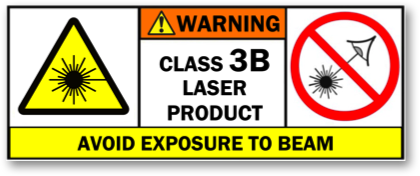Laser Head – Safety & Health Guidelines

THE LASER HEAD IS A CLASS 3B LASER PRODUCT.
Class 3B lasers are hazardous for eye exposure. They can heat skin and materials but are not considered a burn hazard. For visible-light lasers, this laser’s module output power is between 5 and 499 milliwatts at 405 nanometers.
SAFE USE GUIDANCE
The Laser Head is a Class 3B laser product that can reach up to 499 milliwatts. The laser module in this product can emit radiation that causes eye injury if used improperly. Due to the nature of the manufacturing process and the different materials the laser can be shined on, use of laser protective eyewear (provided with this product) is mandatory even if class 3B lasers are usually considered safe if reflected from a matte surface. Even mildly refllective surfaces can cause eye damage.
The risk of eye injury is always present: even a brief exposure could cause retinal damage.
Never look directly at the laser beam focusing point unless you are using the provided safety glasses.
Do not use sunglasses or other glasses unless specifically designed to filter out the same power level and wavelenght of this product’s laser class.
ONLY ALLOW USE BY A RESPONSIBLE PERSON
This is not a toy. Children should not be permitted to use the FABtotum Personal Fabricator when equipped with a Laser Head.
Any teenager using the Laser Head should be continuously supervised by a responsible adult.
DO NOT USE AS A LASER POINTER
Not designed to work stand-alone and to be easily pointed at targets, the purpose of this product is NOT laser pointing.
Use of the unit in this manner is not intended by the manufacturer.
Pointing the unit, reflecting or diverting the beam to another target other than the intended material to be cut or engraved is extremely dangerous and may cause harm or injury.
EYE INJURY HAZARD — DIRECT AND REFLECTED BEAM
Reflections off mirrors, glass, and shiny surfaces can be just as hazardous as the direct beam. Avoid reflected radiation and use of reflective materials.
POTENTIAL EYE INJURY HAZARD – DIFFUSE REFLECTION
Avoid staring at the laser dot at close range, for more than a few seconds even with protective gear. Looking at the laser dot for more than 10 seconds can cause persisting damage.
SKIN INJURY HAZARD
Never interfere with the Laser Head, never place your hand inside the unit at any time.
Do not deliberately attempt to burn skin. This can be very painful, can take long to heal, and can leave a permanent scar.
SMOKE HAZARDS
Airborne particles from laser engraving are dangerous.
Keep in a well ventilated area or use in a segregated room or lab with a fume extractor.
Particulate generated as a result of laser applications is measurable in microns, which means it is small enough to be inhaled. Depending on the material, these particles can cause serious side effects.
IMPORTANT: AVOID DANGEROUS MATERIALS
NEVER USE THE LASER HEAD IN A CLOSED ENVIRONMENT WITHOUT PROPER AIR TREATMENT.
DO NOT USE THE LASER HEAD WITH ANY MATERIAL CAPABLE OF EMITTING SMOKE OR VOLATILE PARTICLES.
DO NOT USE WITH MATERIALS THAT CAN BURN OR SUSTAIN A FLAME.
Never use the Laser Head on materials that may cause dangerous fumes to be emitted and spread. Such fumes can be EXTREMELY dangerous to the health if inhaled or are in contact with skin, eyes and respiratory tract.
While ceramics, glass and wood release microscopic particulate that may cause irritation to the respiratory tract, skin, nose and eyes, metals like steel emit chromium and nickel fumes that are carcinogenic.
Lasered plastics, rubbers and powder coatings produce volatile organic compounds (VOCs). Using a laser system – whether it is cutting, engraving or marking – catalyses VOC gas as it melts the material.Moreover, because these gases are toxic and have the ability to spread quickly, it is important that these fumes are removed immediately.
Synthetic polymers include plastics like polyethylene, polycarbonate, polypropylene, as well as synthetic rubber, polyvinyl chloride (PVC), polyethylene, phosgene and many other materials.
Polyethylene (PET) produces formaldehyde, a noxious VOC and known carcinogen, which means aside from the danger of bringing asthmatic attacks and allergies, it is known to cause cancer.
Rubbers that are exposed to the laser emit benzene, a VOC and recognized carcinogen that may cause death, low white blood cell count, anaemia and cancer.
Polyvinyl chloride (PVC) is a plasticizer that is used to make a multiplicity of products including signage, figurines, flooring and many other products.
PVC emits extremely toxic and corrosive hydrogen chloride acid gas, dioxin, ethylene dichloride and vinyl chloride, which make a very toxic carcinogenic combination.
PVC can cause severe health problems including cancer, neurological damage, as well as reproductive and immune system damage.
Phosgene is an ingredient in most plastics composed of hydrochloric acid. Phosgene destroys lung tissue causing pulmonary edema.
TARGETING AIRCRAFTS AND VEHICLES IS ILLEGAL
Never point, reflect or divert the beam to a moving vehicle or aircraft.
LASER PROTECTIVE EYEWEAR (GLASSES)
The Provided Laser Glasses are mandatory.
Because the eyewear is blocking some or all of the laser’s light (for example, a hazardous reflection) you still should use caution even when using laser protective eyewear.
As you use the laser, any other persons in the area should also have the same type of laser protective eyewear as you, or leave the room if not properly equipped.
DO NOT USE SUNGLASSES FOR LASER PROTECTION
Sunglasses are NOT laser protective eyewear. They are not rated to ensure light-attenuating protection. Most sunglasses will not block enough laser light to significantly reduce hazardous exposures.
use only certified first party equipment or lab-certified equipment rated for class 3B laser products at 405nm.


